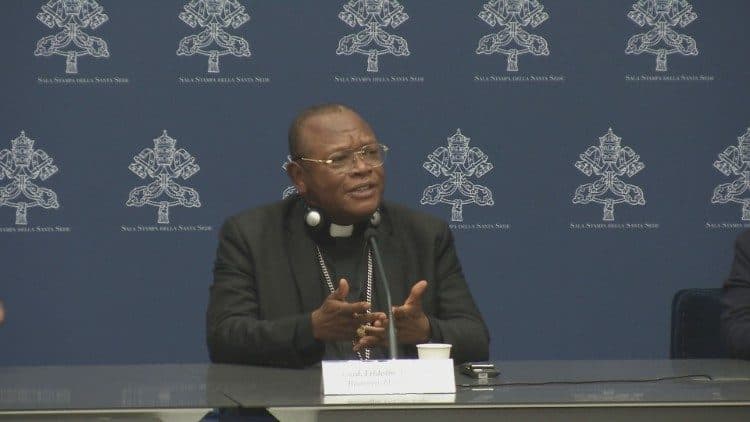YAOUNDÈ, Cameroon – Describing youth as not merely the future of Africa but also its “today,” a leading African cardinal has called for major new investments in education across the continent.
“Dreaming of a new Africa means first and foremost committing to investing in the education of our young people,” said Cardinal Fridolin Ambongo of Kinshasa in the Democratic Republic of Congo. He was speaking Dec. 10 at the end of the first African congress on Catholic education held Dec. 7-10 in Abidjan, Ivory Coast.
“Africa cannot become a continent of despair,” said Ambongo, who also serves as president of the Symposium of Episcopal Conferences of Africa and Madagascar (SECAM) said.
Ambongo said the Catholic Church in Africa has made significant contributions to the education of African peoples through its nursery, primary and secondary schools and universities. Many African leaders have been trained in Catholic institutions, the cardinal noted, before blaming many of those leaders for ignoring the principles of morality that undergird Catholic education.
“Unfortunately, many of our African leaders who have led us into situations of despair, who have ruined our countries, who have created misery, were trained in our schools,” Ambongo said, wondering aloud, “What haven’t we done?”
“Despite the bad news coming from various parts of Africa, we have the firm conviction that God is at work on our continent,” Ambongo said.
He insisted that there’s no way Africa can make headway without a Catholic education that emphasizes the education of the integral person, and noted that the continent’s best hope for a more sustainable future remains investing in its young people.
“If it’s true that young people are very often presented as the future of Africa, let’s also consider them as the today of Africa”, Ambongo said.
Catholic education stakeholders in Africa and around the world, including cardinals, archbishops, bishops, priests, and lay leaders were in Abidjan to review the “African Educational Pact”. Inspired by the Global Compact on Education launched by Pope Francis in September 2019, the African Education Pact seeks to educate young people based both on Christian values and traditional African culture, with the aim of recovering and enhancing interpersonal relationships with a communitarian dimension while strengthening the relationship with God.
Ambongo made the case for collaboration in education at the continental level, and noted that despite the challenges the continent faces “including corruption, conflict and poor governance, which are unfortunately mortgaging the future of its young people, an educational alliance to meet the new challenges of our African societies is necessary.”
“With our families, our Small Christian Communities, our groups, associations and Christian movements, we must learn to work in a spirit of synodality,” he said.
He said such fraternal collaboration and discernment requires a commitment “to raising all the valleys and lowering all the mountains and hills that we encounter on the demanding side of education.”
“We must also iron out all the obstacles that threaten education, the future of our children,” Ambongo said.
“It is as an educational community that we will be able to carve out in the desert of this time, a path for the future of our African youth,” he said.
In a message to the participants, Pope Francis warned against education that is “selective” and “elitist” in nature, and which focuses only on the intellect.
“Africa is not immune to the crisis that today’s education system has become, as in many places, too selective and elitist … aiming to form the intellect alone and not the whole person,” Francis said in a message signed by the Vatican Secretary of State, Pietro Cardinal Parolin.
“Faced with this situation, Catholic Education, by enriching itself with the African Educational Pact, will be able to offer a renewed, more open and inclusive formation, creating in young people a beautiful harmony between thought and action. It will also help shape a generation that draws on the socio-cultural values of the African continent, without succumbing to the temptation to turn in on itself, but also capable of dialogue with other cultures and religions,” the pope wrote
Francis urged African stakeholders to train young people “not for the competitive spirit that leads to selfishness, but for the spirit of community and solidarity. That they may be capable of making positive and constructive choices, of being tomorrow’s decision-makers, committed to building an ever more fraternal society at the service of all, with respect for the common good. Indeed, quality education is a sign of hope and a solid foundation for the peaceful coexistence that Africa needs today.”













